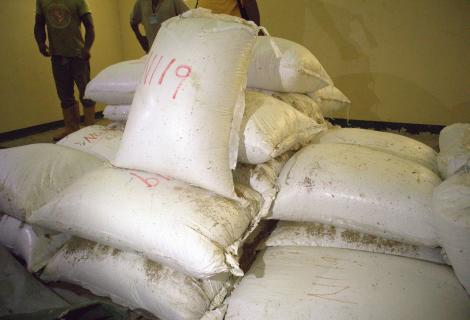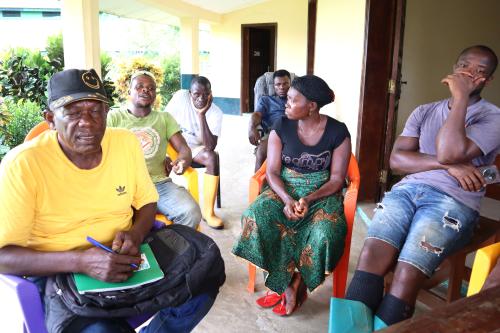Toukpeh Cooperative Farmers Frustrated over Rice Seed Loss, blame Weak SADFONS Implementation by MOA

Maryland County, Liberia – What was expected to be a game-changer for the Toukpeh Cooperative under the SADFONS Project and other farmers in the group has instead had the opposite effect, members say. They report that the initiative quickly deterioted, prompting several farmers to leave the cooperative.
To make matter worse, the rice they produced, intended for sales to others in Maryland under the Seed Multiplication component of the project has been left locked away for almost a year, now laying away for almost a year, now laying in ruins inside the Ministry of Agriculture (MOA) warehouse in the Couty being eaten by insects and rats.
“We did hard work and no benefit.” Mamalo Grisby said. “We suffered a lot and there were no materials and then we even tried and put the rice in the warehouse without getting anything in return, they (CARI) promised to buy the rice, but they failed.” Mamalo went on expressing her frustration.
“As I am speaking to you, the rice is in the warehouse spoiling, that the reason many of the members have stayed away from the work.”
Mamalo and other members of Toukpeh Famers made the disclosure during a recent impact assessment visit conducted by ActionAid Liberia’s Team in Harper, Maryland County.
The

But the group said for almost a year now since they harvested the first 43 bags of 25kg seed rice, the rice has been locked up and laying at the Ministry of Agriculture County Agriculture field office warehouse being damaged by inserts, and rats.
ActionAid assessment team visited the local agriculture field warehouse and saw first-hand the state of the rice and documented the findings.
“They made us to plant the rice and since we brought the rice in the warehouse, we have not benefited anything from it. Only the rats and the insect have benefited from the rice.” Daniel F. Chea and Mamalo expressed their concerns as saying during the engagement.
For more than a year, the cooperative’s harvested seed rice has been in the warehouse deteriorating in quality by rats and insects, something that the group said has left them demotivated.
Toukpeh said what should have been a life-changing experienced for their rice cultivation, has turned out to be a painful symbol of failed efforts by the group contrary to the initial goals of SADFONS supported was intended for. The group said several promises from the Central Agriculture Research Institute (CARI) has been unfilled, including trainings.
“We were selected as an out-grower, and they promised to come and do the training, but we didn’t go through that training.” Paul H. Harmon, chairperson of the Toukpeh Coorperative said.
The group informed AAL team that the lack of adequate support has led to other men preventing their women from returning to the farming group stressing that other men who were members of the corporative have also left the corporative.
When asked about the concerns raised by Toukpeh Farmer Cooperative, Central Agriculture Research Institute (CARI) field officer, Robert J. Gwekole put the challenges for the delays in the training and extension support on the Ministry of Agriculture which he says controls CARI’s budget and every procurment processes.
“When the farmers said that they were about 43 and now they are active 15 members, has been a challenge for us, because when we tell the farmer that this is going to happen for them and they don’t see it, that has brought setback and it’s difficult.” Gwekole told ActionAid.
Gwekole added “To even get the active 15 members to work is even difficult for us.”
Under the SADFONS, CARI was to train the cooperative members in seed multiplication, link the famers to market and then increase awareness among farmers across the counties to purchase the produced seeds from Toukpeh cooperatives, but Toukpeh say this has not been the case.
Several cooperative members criticized the fragmented implementation of SADFONS initially introduced as a project directly overseen by the Ministry of Agriculture but later outsourced to several partners. According to them, this shift has created administrative gaps thereby grossly affecting funding, communication, and timely delivery of essential project needs.
“When money or materials come, it passes through too many hands. By the time it reaches the farmers, it is either delayed or insufficient,” said Daniel F. Chea, a member of cooperative.
Not only has the group not been able to sell the seeds they investing time and efforts in producing, but they said with the coming of SADFONS, there has been shrinking in their farmland space coupled with unmet Infrastructure needs.
Prior to SADFONS support in 2022, the cooperative cultivated three hectares with rice, cassava, and vegetables, producing an estimated five tons of rice annually. But farmers say the project’s launch coincided with a reduction in their farmland to now 2 hectares.
This they added was due to another farming group known as Agriculture Liberia currently occupying a portion of the land thereby dropping their initial land space from 3 hectares to 2 hectares producing only forty-three 25-kg bags of rice unlike in the past when they harvest 5 metric tons of rice.
Daniel Chea added that prolong promised of the construction of irrigation system to enable them farm in a more sustainable way and also ease the water challenges experience are among some of the very few reasons why the corporative wants the SAFONS project to continue. Although they do not know how fast they would come.
“The reason we want SADFON to continue for example is, if they erect the irrigation system, I would not need to use the watering cane to water. Chea explained with smile beaming in his face, but he said “But if we say SADFONS should close down, it means that we will continue using watering cane and that other promise will not happened, so that’s the reason I want SADFONS to continue.”
As the meeting came to a close, Toukpeh corporative called for a direct support pleading with the MOA to deliver on the deliverables under the SADFONS project so as to boost famers confidence, prevent losses and boosts yields.
“We want a grant directly to the cooperative. If that happens, we will expand our fields, hire laborers, and put the women back to work planting and protecting the farms,” Paul Harmon, the chairperson of Toukpeh said.
According to the corporative, the impact review by ActionAid has afforded them the opportunity to voice their concerns directly centered around SADFONS support to the group, while at exploring ways SADFONS Implementing partners can improve on project deliverables to meet with the aim and objectives of the project in order to meet real time farmers success and boost food production.